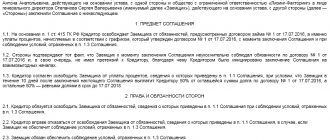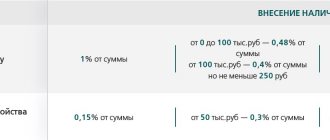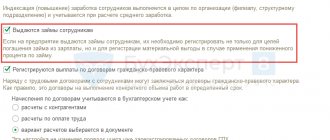In the process of financial activity, many companies provide loans to each other. Previously, we looked at how to apply for interest-bearing loans. In continuation of the publication, this article will be devoted to interest-free loans between legal entities.
There are no restrictions in Russian legislation when concluding an interest-free loan agreement between legal entities. However, there are certain nuances when drawing up such agreements that you need to be aware of in order to reduce tax, legal risks and other negative consequences. Let's talk about this in more detail, and at the end of the article we will provide a sample loan agreement (interest-free) between legal entities.
Interest-free loan agreement between legal entities (general and specific information)
To qualify legal relations between persons as borrowed, it is enough to establish the essence of the obligation when one person borrows from another the items listed in paragraph 1 of Art.
807 of the Civil Code of the Russian Federation, with the obligation to return them. According to paragraph 4 of Art. 809 of the Civil Code of the Russian Federation, the interest-free nature of such an agreement is established “by default” when there is no other direct indication in its text, in cases where:
- the subject of the contract is not money, but other things;
- the counterparties to the transaction are individuals (including individual entrepreneurs), and it was concluded for an amount not exceeding RUB 100,000.
Based on paragraph 1 of Art. 809 of the Civil Code of the Russian Federation, in order for borrowing between individuals (amounting to more than 100,000 rubles) or legal entities to be interest-free, the text of the relevant transaction must contain a clear indication that no interest is charged on the loan. If there is no such wording, interest will be charged on the transaction.
An interest-free loan agreement between legal entities indicates:
- the lender's trust and interest in the borrower's success;
- their mutual dependence (Article 105.1 of the Tax Code of the Russian Federation). Then this deal may attract the attention of tax authorities. If it seems to them that there is no obvious dependence, they will demand an increase in the income tax base by the amount of interest that could have been received when borrowing between non-interdependent persons in a comparable agreement, according to the letter of the Ministry of Finance of Russia dated October 5, 2012 No. 03-01-18/7 -137, which is advisory.
Sample interest-free loan agreement between legal entities
Taxation
Lenders are not subject to taxes, because... There is no income; with regard to borrowers, the question is somewhat different:
- Borrowers who are interdependent companies, receiving funds at zero interest, according to the Ministry of Finance, acquire economic benefit, which is included in the concept of “taxable base”;
- If property is transferred between individuals, then the need to pay taxes does not arise. But if a citizen has obligations to a legal entity. person or individual entrepreneur, this entails the obligation to pay material benefits at the time of repayment of the debt;
- If a gratuitous loan for housing was issued, then individual borrowers are exempt from personal income tax on the acquired benefit - if they have the right to property deduction;
- The participation of legal entities on the lender's side does not lead to tax consequences.
State control over transactions
If the borrowing is provided by a non-credit organization and its amount is equal to or more than 600,000 rubles, the transaction will be controlled by the state within the framework of the Federal Law of 08/07/2001 No. 115 “On combating the legalization (laundering) of proceeds from crime and the financing of terrorism.” This means that an organization that is not a credit institution is required to report information about such borrowing to Rosfinmonitoring. The bank tracks borrowed payments on an accrual basis, when the total amount under the agreement is equal to 600,000 rubles. or exceeds this figure.
Failure to provide such information will result in liability under Art. 15.27 Code of Administrative Offenses of the Russian Federation. If a non-credit organization systematically acts as a lender, this may lead to liability under Art. 172 of the Criminal Code of the Russian Federation.
If cash is transferred under an interest-free loan agreement, its maximum amount (according to clause 6 of Bank of Russia Directive No. 3073-U dated October 7, 2013 “On cash payments”) is 100,000 rubles.
Including clear provisions in the contract on:
- the subject of borrowing (with its exact characteristics);
- modes of its transfer and return (including the loan repayment period).
Such transactions involving bankrupt debtors are more often contested: through them, bankrupts may try to withdraw money or change the order of creditors’ claims.
A loan agreement between an LLC and an LLC is also possible, since the law does not establish any restrictions in terms of the organizational and legal form of participants in loan relations. When signing such an agreement, it is better to check the powers of the representatives of the participants, since such agreements are often challenged due to the lack of proper powers of the signatories.
Loan from a participant: risk of contract requalification
However, in some cases, when concluding a loan agreement, civil legal risks are still present. They are associated with the possibility of recharacterizing an interest-free loan that an organization received from its founder or participant into a non-repayable contribution to the organization’s property.
The court may make such a conclusion if the loan was issued for a long period (for example, for a period exceeding three years), or the term of the loan agreement was repeatedly extended. The risk also arises if the amount transferred as loans was not claimed after the end of the contract.
Recharacterization of the agreement is also possible in other cases if the court, taking into account the circumstances of the issuance and repayment of the loan, comes to the conclusion that the lender did not intend to get the money back. In particular, the risk zone includes interest-free loans, the issuance of which included such purposes as “ensuring economic activity”, “business development” or “replenishing working capital” (see, for example, the ruling of the Arbitration Court of the Khabarovsk Territory dated 01/09/18 No. A73-18372/2017).
Find out about the claims brought against your potential counterparty
Note that if the court makes such a decision, the lender will lose the opportunity to return his money. However, for the borrower, recharacterization of the agreement will entail tax consequences only if the funds were received from a manager who is not a participant. After all, such a person cannot contribute to the property of the LLC (Article 27 of the Federal Law of 02/08/98 No. 14-FZ “On Limited Liability Companies”, hereinafter referred to as the LLC Law). This means that the borrower will have to include money recognized as irrevocable as income, since these amounts do not fall within the scope of subclause 3.7 of clause 1 of Article 251 of the Tax Code of the Russian Federation. (We would like to remind you that this rule allows you not to take into account the contribution to the property of an LLC in income only if it was received in the manner established by the civil legislation of the Russian Federation).
Application for provision of tranche
The application is usually attached to the contract. There are no legal requirements for completing such an application; usually the amount of borrowing that is requested is noted there, plus the details by which it is transferred. The court regards the document as evidence of the provision of the loan.
It is necessary to conclude and execute a transaction taking into account the following:
- a fee may be charged for changing the tranche return schedule;
- the absence of an application may be regarded by the court as evidence of non-conclusion of an agreement;
- any new tranche must be taken into account as a new debt obligation and the key rate of the Central Bank of the Russian Federation, current on the date of raising funds, must be applied to it (Letter of the Ministry of Finance of the Russian Federation dated October 4, 2018 No. 03-03-06/2/71370);
- The lender and borrower have the right to refuse to provide borrowing in whole or in part (Clause 3 of Article 807 of the Civil Code of the Russian Federation). In order to refuse, the lender needs circumstances indicating a failure to repay the loan on time. For such a refusal, the borrower must notify the lender about it before the deadline when he (according to the agreement) must return the borrowed item, and in the absence of this deadline - at any time (before receiving the loan), unless otherwise provided by legal acts or the agreement;
- when the borrowing is repaid in installments, then if the borrower violates the deadline established for repaying the next part of the loan, the lender has the right to demand early repayment of the entire remaining amount plus interest for the use of the loan, which is due at the time of its repayment (clause 2 of Article 811 of the Civil Code of the Russian Federation).
The essence of gratuitousness
Borrowing relationships have the right to be formalized both on the terms of interest repayment and free of charge . But this requirement must be specified in the contract being concluded, because its absence does not automatically turn the loan into interest-free according to the Civil Code of the Russian Federation, unless:
- We are not talking about a transaction between individuals. persons with a loan not exceeding fifty minimum wages and not related to the business of at least one party;
- The subject of civil law relations is not financial means, but things.
In other situations, when the percentage is not fixed, it will be calculated according to the refinancing rate approved on the date of debt repayment.
An interest-free loan means that there is no remuneration to the lender for the transferred benefits, but not its irrevocability.
If the agreement is concluded as interest-free, then early repayment is allowed without the consent of the lender, because he has no profit.
Commodity loan between legal entities
A commodity loan agreement between legal entities is concluded in writing (Clause 1, Article 808 of the Civil Code of the Russian Federation). Moreover, you can choose how to conclude it:
- as a separate document with signatures of participants;
- through the exchange of letters, emails, telegrams.
Items received from the lender must be described in as much detail as possible (indicating their name, qualities, completeness, packaging, etc., as well as their quantity). If the quantity is not determined, then in order to recognize the conclusion of the transaction, it is necessary to prove the actual transfer of the borrowed property in this quantity (by the borrower’s receipt or other document). It is also necessary to specify the procedure for returning things to the lender. This is how things that are characterized as goods and subject to turnover are transferred.
Commodity loan agreements are available to any entity. Exceptions are possible when the subject of the agreement is things whose circulation is limited, since their transfer requires special powers. The rules of paragraph 3 of Art. apply to commodity loan agreements. 807 of the Civil Code of the Russian Federation.
The term is usually not an essential term of loan agreements. When there is no provision about it in the text of the agreements or when determining the period by the moment of demand, the borrower will have 30 days from the moment the lender submits a demand for repayment of the loan to satisfy it.
If the text indicates the consideration of the transaction, in addition to the type (money or in kind) plus the amount of interest, the payment mode should also be agreed upon. Otherwise, the situation will be resolved through Art. 809 of the Civil Code of the Russian Federation.
For what period can a loan be issued?
The period for which borrowed funds can be provided is not limited by law. Moreover, the Civil Code of the Russian Federation directly allows for the conclusion of a loan agreement, including interest-free, without specifying a term at all, or “on demand”.
However, there are still some restrictions on the loan term. They are related to the statute of limitations. The fact is that, according to paragraph 2 of Article 200 of the Civil Code of the Russian Federation, the limitation period for open-ended obligations or “on demand” obligations cannot exceed ten years from the date of their occurrence. So it turns out that if the lender claims to return the transferred amount, then an open-ended loan, as well as a demand loan, cannot exist for more than ten years. In other words, so that the statute of limitations does not expire and the borrowed funds do not turn into the borrower’s income, you will have to return the money to the lender once every ten years and enter into a new agreement.
Order an electronic signature for remote submission of documents to the court Receive in an hour
Advice
It is better to fix in the contract the period for which the money is transferred. This period can be any, and it can even exceed ten years. In this case, the above rule of paragraph 2 of Article 200 of the Civil Code of the Russian Federation is no longer valid, and the maximum limitation period is counted from the date of violation of the obligation to return money (Clause 2 of Article 196 of the Civil Code of the Russian Federation).
Loans between individual entrepreneurs
An individual entrepreneur can provide a loan to another individual entrepreneur with or without interest, but should not do this often, since otherwise a microfinance organization will have to be established. With the interest option, you will need to pay income tax. For example, when using the simplified tax system, lenders pay 6% of profits. The borrower pays for the interest-free loan.
For loan agreements to be valid, they note:
- Dating (with document number).
- Who is participating?
- Amount of debt and currency.
- Interest rate or necessarily no interest rate.
- Debt repayment period.
- How will repayment occur?
- Rights and obligations of participants.
- How disputes are resolved.
- Details plus visas of the parties.
Sample loan agreement between legal entities
Sample loan agreement between LLC and LLC
Loan in tranches
Application for tranche
Commodity loan
In what form is the contract drawn up?
A loan agreement between legal entities (interest-bearing or interest-free) is always drawn up in writing. This is a mandatory condition if legal entities are parties to the agreement. If the parties ignore this legal requirement, the transaction will be declared invalid. Also, if the case comes to trial, it will be impossible to prove the fact of concluding an agreement orally with the help of witness testimony.
The agreement contains essential and additional conditions. It is very important that all essential conditions are recorded in the text. If they are missing, the agreement will not have legal force. If necessary, the document can be certified by a notary, who will ensure that the document is drawn up in accordance with legal requirements. But such assurance is not mandatory and is voluntary.
A loan agreement between legal entities (sample 2020) can be found at the end of this article.
The parties to the agreement are:
- lender;
- borrower.
In the considered version of the agreement, all participants are legal entities. Borrowers can be both commercial and non-profit structures.
The funds transferred as the subject of a loan must belong to the lender by right of ownership. The funds received as a loan can be used by the borrower only to fulfill the purposes listed in its charter.





